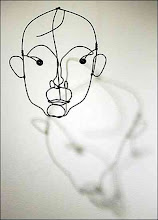If you think the idea of a self distributed over several locations (people) is sheer lunacy, then you should check out a lunar drama called Moon, directed by Duncan Jones (who also happens to be the son of The Man Who Fell to Earth). Sam Bell believes himself to be the lone employee working on a 3-year contract on a moonbase to harvest a new energy source and send it back to Earth. Sam, it turns out, is a clone who discovers he is a clone by accidentally meeting a fellow clone and who, with the help of a self-aware, emoting, intelligent computer named GERTY, discovers a cache of other unawakened clones stored away in a hidden storage room in the base. [By the way, we know that GERTY emotes because of the emoticons displayed on his screen. You might argue that a machine cannot display true empathy and that the emoticons are displayed only in response to an algorithm the computer uses to recognize an interlocutor's emotion based on speech and behavior patterns. My response would be "What is empathy other than the ability to recognize emotion and to respond to it appropriately?"]
Sam and his fellow clones either are designed to die after three years of service (the “contract”) or it’s a flaw in the cloning process—that point is never made clear. If the clones are not “programmed” to fall apart at that point, then there are at least memories “downloaded” into the clone mind not only to suggest a personal history that is reinforced by fictional communiqués from family back home, but also to justify getting the clones into a transport pod for return home that actually turns out to be an incinerator.
The spookily-voiced (by Kevin Spacey) GERTY is a kind of obverse of HAL—vaguely threatening, but in the end “there to help” Sam. GERTY helps Sam in ways that one would think would be contrary to his programming, as Sam actually says at one point (“But I’m here to help you, Sam”, says GERTY). Later, GERTY says something to Sam about his programming, and Sam tells him “We’re not programmed; we’re people!” Or a person—the Sams and GERTY share memories, they feel empathy for each other, they contribute toward common goals, they argue with each other about the best way to go about reaching those goals in a way that is similar to our own internal arguments.
The Sams believe for most of the film that communication with Earth had been cut off three years earlier when a satellite went down. In reality, the link is merely being blocked and GERTY is able to unblock it and have direct communication with the outside world. Later GERTY helps Sam avoid the signal blocking and Sam is able to contact his home; he discovers that his daughter is 12 years older than he thought her to be and that another Sam (the original, we presume) is back home.
One also could read the moon itself as a kind of brain, with its gray, bumpy surface, its multiple bases with specific functions (input/output, collection/storage, etc.) multiple functionaries (the Sams, GERTY) that speak to each other, a great deal of “storage”, the desire of the functionaries within the brain to speak to “the outside” and work towards certain goals together.
This setup is enriched by the fact that Sam Bell is played by Sam Rockwell. This casting (in fact, we are told that the role was written as a "vehicle" for Rockwell) encourages us to extend the analogy beyond the limits of the film. When an actor “plays” a character, the character in the film take on the person-ness of the actor. Tess of the D’Urbervilles will forever be Nastassja Kinsky, for example, in the minds of those who have seen the film. Surely, also, the actor must “become” the character to some degree (and the better the actor, the greater the degree); That becoming doesn’t just go away at the end of the film. Sam Rockwell is forever also the Sams. So, in addition to reading the moon as a kind of big brain in this film, one can also read Moon as a kind of uber-self, containing a number of component selves working together.
Moon was made on a budget of only $5 million, and the effects and light (models, not CGI) are beautiful. Check it out!
Subscribe to:
Post Comments (Atom)




No comments:
Post a Comment